Key takeaways:
- Organic gardening fosters a deep connection with nature, emphasizing sustainable practices and biodiversity over synthetic chemicals.
- Key principles include soil health, biodiversity, and collaboration with natural ecosystems to address challenges like pests and weeds.
- Patience and strategic planning are essential for successful organic gardening, highlighting the importance of nurturing both plants and personal skills.
- Community support and continuous learning are vital in the journey toward mastering organic gardening and achieving certification.
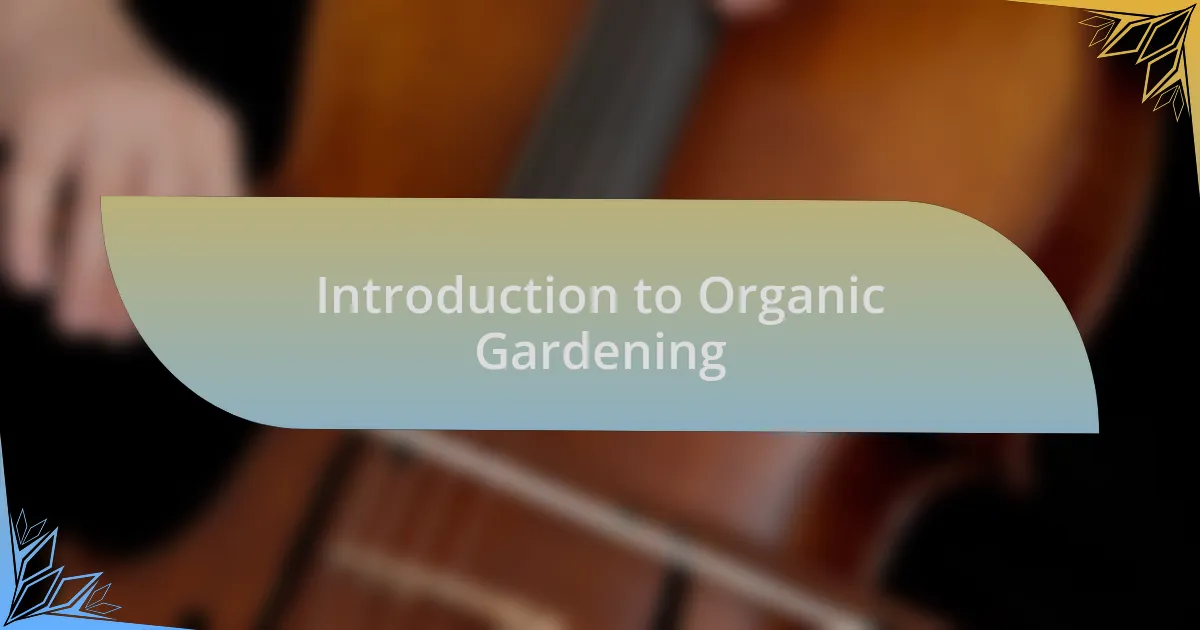
Introduction to Organic Gardening
Organic gardening is more than just a method; it’s a rewarding journey that connects you with nature. When I first started my own garden, the thrill of nurturing plants without synthetic chemicals was both exhilarating and daunting. I remember standing in my backyard, overwhelmed by the sea of possibilities, and wondering, how do I even begin?
As I delved deeper into organic practices, I experienced a profound shift in my relationship with the environment. I began to appreciate the beauty of biodiversity, understanding that a healthy ecosystem thrives when we let nature take its course. Can you recall a time when you felt a true connection to the earth? For me, it was as simple as observing the butterflies visiting my blooming flowers, reminding me of the importance of harmony in the garden.
Incorporating organic methods also meant making mindful choices about what I put back into the soil. It became a personal commitment to care for the planet and myself through what I grew. Each season brought new lessons, but the most significant one was realizing that gardening organically isn’t just about avoiding chemicals; it’s about cultivating a philosophy that embraces sustainability and respect for nature. How has your understanding of gardening evolved over time?
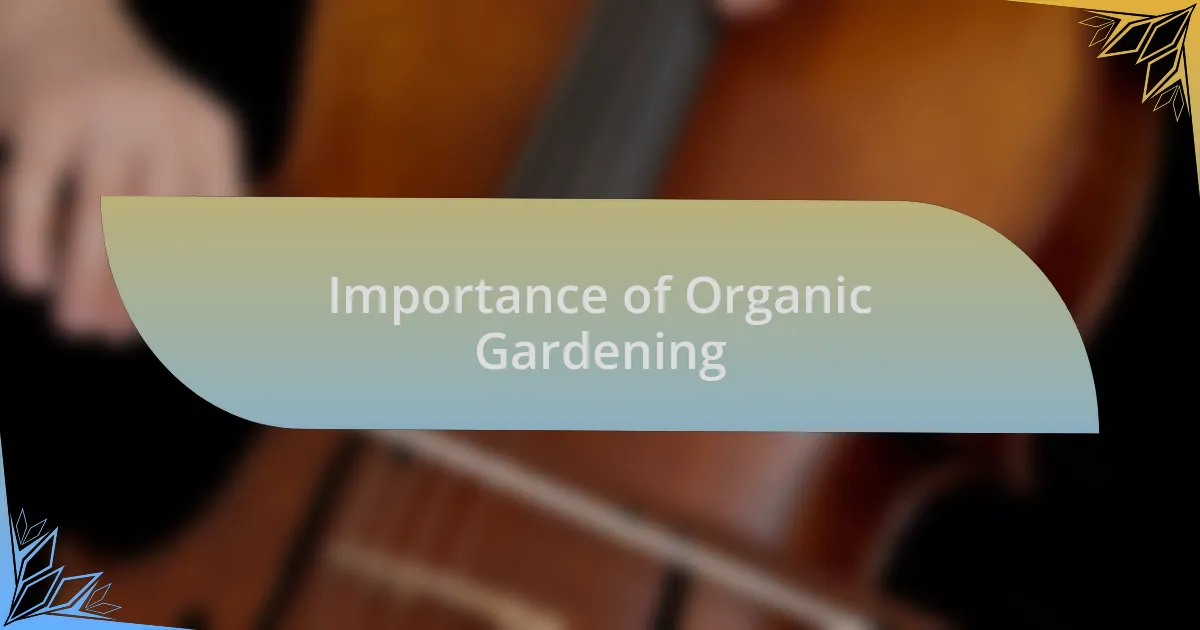
Importance of Organic Gardening
Organic gardening plays a vital role in promoting environmental health, which I quickly learned as I watched my garden flourish without harsh chemicals. The insects that once seemed like nuisances transformed into allies, creating a balanced ecosystem where pollinators thrived. Have you ever seen a hive of bees busy at work, knowing that they are essential for the plants you’re nurturing? That sight reinforced my belief in the interconnectedness of life.
Moreover, growing organic means ensuring that the food I cultivate is safer for my family and the community. I vividly remember the first time I harvested fresh tomatoes, knowing there were no synthetic pesticides involved. The taste was not just delicious; it felt pure and untainted. Isn’t it incredible to consider that what we grow can impact our health so directly?
Lastly, embracing organic gardening fosters a sustainable lifestyle that extends beyond the garden. I’ve found that my commitment to sustainability has influenced other areas of my life, encouraging me to make eco-friendly choices everywhere. How about you? Have you experienced a shift in your daily habits since you started gardening? For me, this journey has been about much more than plants; it’s a path toward a greener future for all of us.
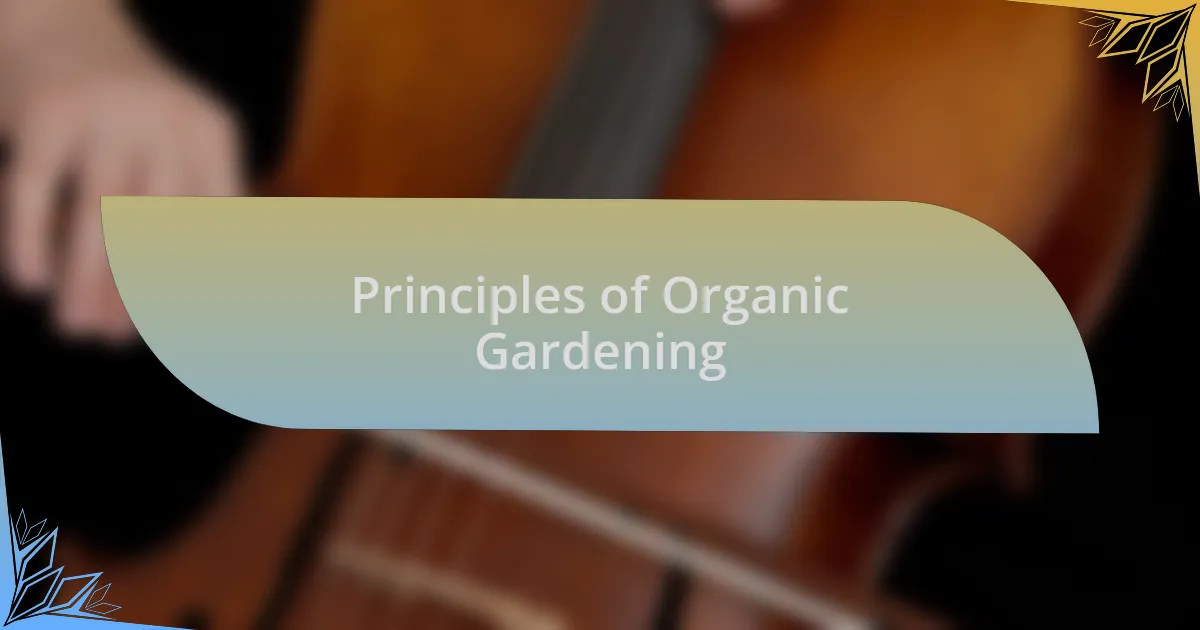
Principles of Organic Gardening
Organic gardening rests on a few core principles that guide every action I take in my garden. One essential aspect is the importance of soil health; I often think of soil as the foundation of my garden’s success. It’s not just about planting seeds, but nurturing the earth itself. By adding compost and natural amendments, I’ve witnessed first-hand how rich soil enhances plant growth and resilience. Isn’t it fascinating how something so fundamental can make such a difference?
Another key principle involves biodiversity. I’ve learned that by planting a variety of species, I encourage a myriad of beneficial insects and organisms to thrive in my garden. For instance, the first time I introduced companion planting, I was amazed at how marigolds attracted pollinators while deterring pests. Have you ever observed how a diverse garden feels alive with activity? Each layer of plants supports the other, creating a interconnected network that bolsters overall health.
Finally, the idea of working with nature instead of against it resonates deeply with me. There was a moment when I faced an unexpected pest invasion, and rather than reaching for chemicals, I reflected on how nature can manage itself. By deploying natural predators, like ladybugs, I ultimately found a solution that felt right and sustainable. This experience solidified my belief that organic gardening is about balance—a reminder that sometimes the best approach is to step back and let nature take the lead.
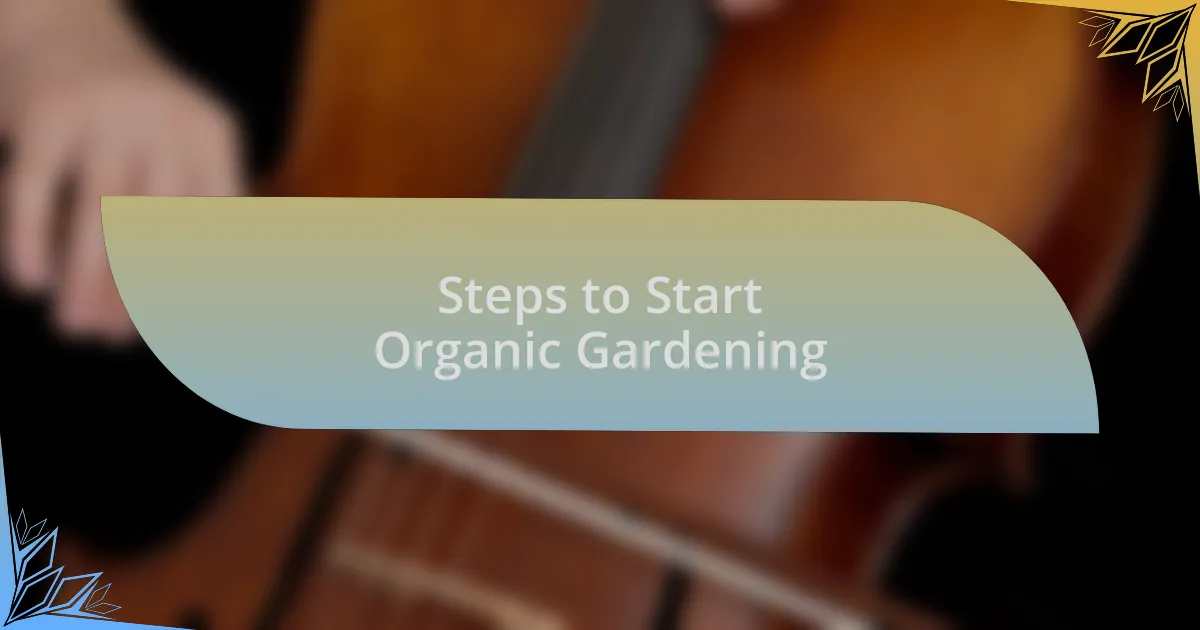
Steps to Start Organic Gardening
To start organic gardening, the first step I recommend is selecting the right location. Over the years, I’ve realized how vital sunlight and soil quality are. My initial garden spot, shaded and rocky, led to frustration—plants struggled to thrive. Choosing a sunny, well-drained area transformed my gardening experience. Can you imagine how your plants would flourish in a perfect spot?
Next comes the joy of planning! I like to sketch out my garden layout. It’s not just about aesthetics; it’s a strategy that helps me balance plant heights and growth habits. I remember feeling the excitement as I arranged my pots in a way that would optimize space and nutrients. How satisfying is it to know that every flower and vegetable has a purpose in your garden tapestry?
Finally, I dive into soil preparation. Each time I mix in compost and organic materials, I feel a deeper connection to my garden. The rich smell of the earth and the texture of healthy soil make my heart race. Have you ever felt that rush? Taking the time to enrich your soil not only inspires growth but also sets the stage for everything else to come.
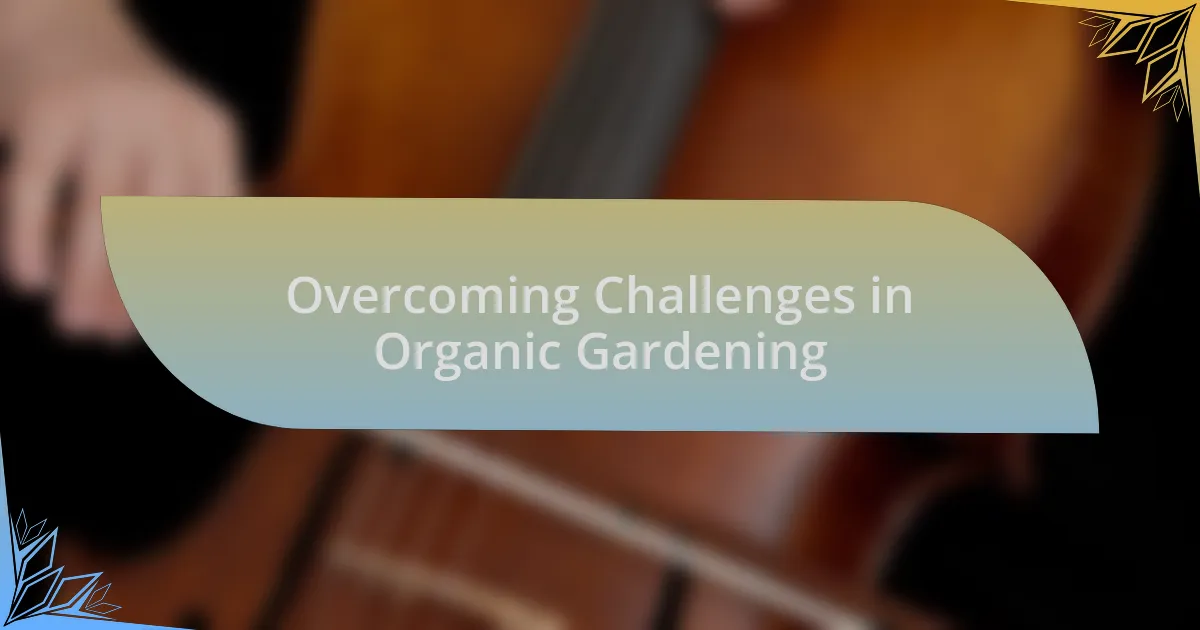
Overcoming Challenges in Organic Gardening
When I first started my organic gardening journey, pests were one of my biggest hurdles. I remember waking up one morning to find aphids feasting on my beloved kale. It was disheartening, but instead of giving up, I researched natural pest control methods, like introducing ladybugs. Have you ever felt the thrill of turning a challenge into a solution?
Weeds also posed a significant challenge, constantly competing for precious nutrients in my garden. In those early days, I would spend hours pulling them out, only to return the next day and find more had appeared. Over time, I learned about mulching and crop rotation, which helped suppress weeds and protect my plants. Can you recall a time when you realized that patience and strategy can alter the course of your gardening efforts?
Weather fluctuations have tested my resilience as an organic gardener. Once, a sudden frost threatened to wipe out my tomato plants. I rushed to cover them with blankets, praying for a miracle. This experience taught me the importance of being prepared and adaptable. How valuable is it to develop a toolkit of strategies to safeguard your garden against unexpected challenges?
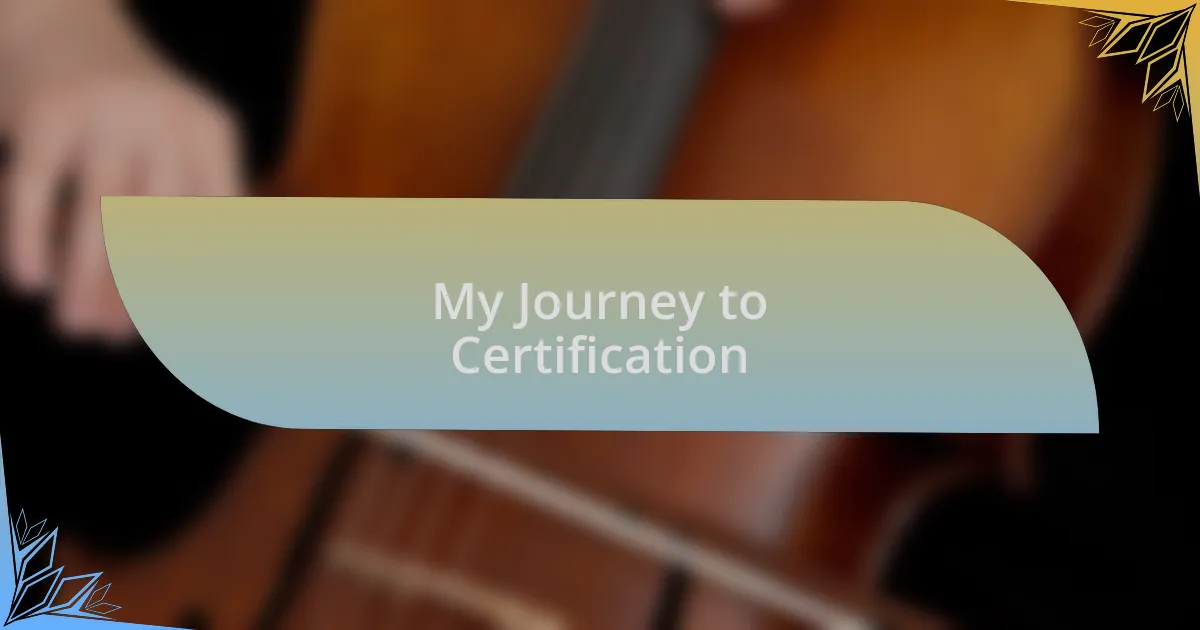
My Journey to Certification
Achieving my organic gardening certification felt like a mountain to climb, but with determination, I embraced the journey. I poured myself into studying the principles of organic practices, eager to gain a deeper understanding. Remember the feeling of pouring over textbooks, trying to capture every detail? It brought me a mix of excitement and apprehension, knowing that each page turned was a step closer to my goal.
Networking with fellow organic gardeners became an invaluable part of my journey. I attended workshops and joined local gardening clubs, sharing both struggles and successes. I still recall the warm camaraderie at one event where we swapped tips and tricks over homemade snacks. Have you ever experienced how community support can reignite your passion for something you love?
The final exam for certification felt like a rite of passage, testing everything I had learned. When I walked out of that exam room, my heart raced with anticipation and fear of failure. In that moment, I realized that the journey mattered as much as the destination. Isn’t it interesting how often the process of becoming is as meaningful as the achievement itself?
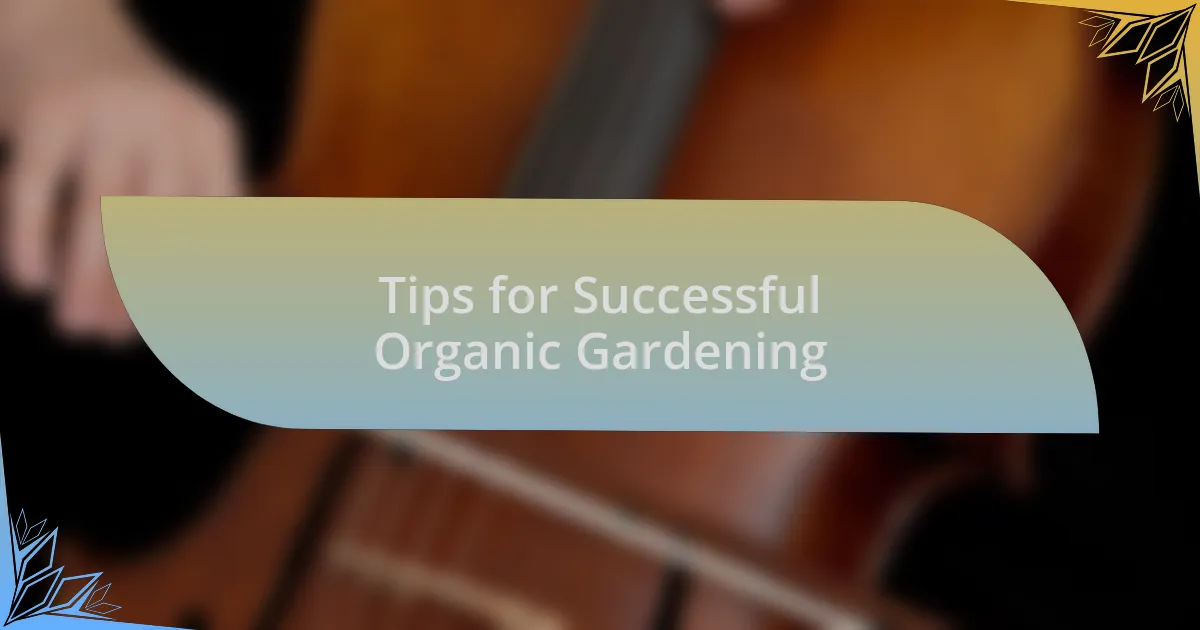
Tips for Successful Organic Gardening
One of the most critical tips I learned along my organic gardening journey is the importance of soil health. Healthy soil is the foundation for thriving plants. I remember the first time I conducted a soil test, and the results revealed nutrient deficiencies I hadn’t even considered. With proper amendments, my garden flourished, proving to me that what lies beneath the surface truly matters. Have you ever noticed how vibrant a garden can look after a little extra care to the soil?
Pest management is another area where organic practices shine. I used to fear that pests would destroy my hard work, but then I discovered companion planting. For instance, I paired marigolds with tomatoes to deter nematodes. This strategy not only kept pests at bay but also provided a splash of color in my garden. It was a revelation—that we could encourage natural pest control rather than resorting to chemicals. Have you thought about how small changes can lead to significant impacts in your gardening approach?
Lastly, patience is key in organic gardening. I’ll never forget the first season when I sowed seeds but didn’t see immediate results. I learned that nature has her own timeline, and sometimes, we just have to wait. By nurturing my plants and avoiding the urge to rush, I cultivated not just vegetables but a deeper appreciation for the process itself. Isn’t there something beautiful about waiting for the fruits of your labor, allowing the journey of growth to unfold at its own pace?